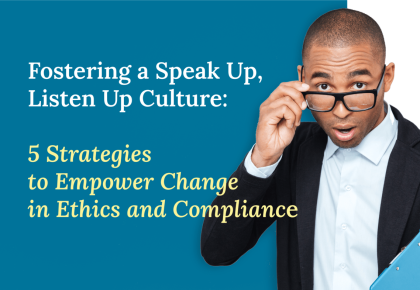Navigating the Ethics Minefield: Mitigating Ethical Risks in Mergers and Acquisitions (2024 update)
Mergers can present a unique set of ethical challenges.
Mergers and acquisitions (M&A) can be exhilarating yet turbulent times. While presenting exciting growth opportunities, they can also breed anxiety and a fertile ground for unethical behavior. The 2023 National Business Ethics Survey paints a concerning picture: M&A participants experience a 23.7% surge in misconduct compared to pre-deal environments.
Why the spike? Several factors converge:
- Employee anxieties: Job cuts loom large, fueling a scramble to secure positions—some resort to desperate measures, like fudging data or sabotaging colleagues.
- Reluctant whistleblowers: Employees hesitate to report after witnessing misconduct, fearing reputational damage or being labeled “troublesome” during a sensitive period.
- Leadership blind spots: Preoccupied with deal mechanics, leadership often overlooks ethics initiatives, leaving a compliance vacuum.
Pre-closing:
- Environment assessment: Evaluate the target company’s operating environment (high-risk industries, etc.)
- Ethics & compliance infrastructure review: Analyze reporting hotlines, policies, training, and past investigations.
- Current compliance culture assessment: Gauge employee attitudes towards ethical conduct and reporting of misconduct.
- Third-party vetting: Scrutinize key business partners for potential ethical shortcomings.
Post-closing:
- Cultural integration: Embed the desired compliance culture in the merged entity.
- Ethics & compliance training: Train all employees on critical risks and expectations.
- Clear policies & procedures: Establish and communicate concise regulations for acceptable behavior.
- Reporting mechanisms: Ensure accessible and confidential channels for reporting misconduct.
Your organization’s risk-reduction playbook:
- Risk assessment with teeth: Conduct a comprehensive ethics & compliance risk assessment, identifying areas of concern and developing targeted mitigation strategies. This includes educating and training impacted employees.
- Mandatory certifications: Employees facing new risk areas (e.g., international anti-bribery regulations) require certification to verify their understanding of updated policies.
- Confidentiality agreement reinforcement: Train employees handling sensitive information about their responsibilities and the consequences of confidentiality breaches.
- Cultural assessment: Uncover the “ethics temperature” of the organization through interviews, surveys, and focus groups. Identify employee views on reporting, acceptable behavior, and accountability.
- Championing whistleblowing: Emphasize the importance of reporting misconduct during M&A, highlighting how it safeguards the deal and fosters a positive workplace culture.
By acknowledging the potential for ethical pitfalls and proactively implementing these measures, organizations can navigate the M&A landscape more confidently, mitigating risks and emerging more robust and ethically grounded.
Remember, a successful M&A is not just about financial gains; it’s about building a foundation of trust and integrity.
We Have the Answers
Feel free to contact a member of Syntrio’s staff to see how we can work together to make your workplace culture all it can be.



